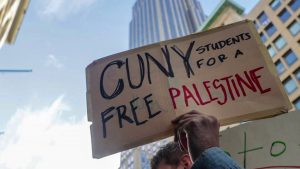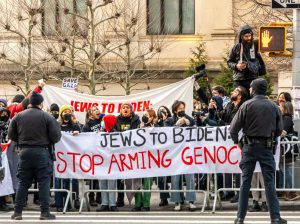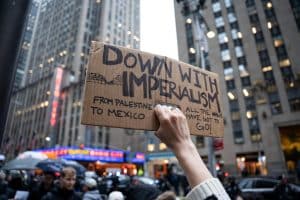Leaders of the University of Michigan have submitted a draft proposal to the community, laying out a policy of extreme repression against protests of all kinds. The policy “applies to all students, employees, contractors, volunteers, and visitors” and defines a very broad range of prohibited activities:
No Person may disrupt the University Operations of UM Facilities, including but not limited to the communications or activities of speakers or performers on University Facilities, or of any class, laboratory, seminar, examination, performance, formal proceeding, activity in a reserved space, field trip, or other educational, research, artistic, athletic, medical, operational, or service activity occurring on UM Facilities by obstructing lines of sight, making loud or amplified noises, projecting light or images, or otherwise creating substantive distractions.
This kind of language could reasonably apply to nearly any speech on campus, including peaceful marches, dissent in classrooms, union activities, and protests against invited speakers (like white nationalist Richard Spencer, whose planned visit in 2017 was eventually canceled because of continuous pressure from students, faculty, and the broader community). These activities are all essential to a free and open university and for a democratic community. When the university administration labels them all as “disruption” in blanket terms, they clearly stake themselves against freedom of speech and intellectual engagement.
Just as troubling is their broad proposed ability to punish anyone the university deems disruptive:
If the University has good cause to believe that a Person has violated this Policy, the University may take immediate action to prevent ongoing and further disruption and hold the Person accountable to the full extent of its authority under existing laws, ordinances, and University rules—including requests for misdemeanor charges
Enforcement of the policy is based solely on the university administration’s discretion, allowing them to respond as they see fit. This statement should be taken as a very lightly-veiled threat of police violence, especially given the recent examples of heavy repression of activists on campus. Following a picket during a graduate student strike last year, campus police followed two graduate students off campus and attempted to arrest them before community members demanded their release. In November, a protest demanding that the university divest from companies profiting from the genocide in Gaza ended with more than 40 arrests and citations, as huge numbers of police units from across the county convened on campus to aid in the repression. Given their very brazen willingness to use police violence, the university’s proposal should be especially troubling for anyone wary of these kinds of anti-free speech repression.
It is especially ironic (though not surprising) that the university administration is framing this repressive statement as a measure designed to protect freedom of speech and expression. The proposed language states that: “No one has the right to infringe on the exercise of others’ speech and activities by disrupting the normal celebrations, activities, and operations of the University.”
The proposed policy was drafted, the university claims, as a response to a pro-Palestinian protest at a university honors event on March 24th, but the administration has been publishing statements laying the groundwork for a more authoritarian approach to campus protests for several months, including a statement on “Principles of Freedom of Thought and Diversity of Opinion” which was approved by the Board of Regents in January. This statement contains similar language limiting the free expression of speech and states that the university has the right to “regulate the time, place, and manner of expression.” The university also unilaterally canceled two student government referendum votes in November, one condemning the use of police violence against protestors and another calling for divestment from companies profiting from Israel’s occupation of Gaza.
The draft statement was submitted to the university community for comments. The survey is open until April 3. However, the message sent to the community was unclear about how such results would be used or if the results would be made public.
This authoritarian move by the University of Michigan administration comes amid a wave of crackdowns on free speech across the country. Universities have cited right-wing pressures in government as a motivation for such repression, arguing that they are acting out of an excess of caution. The University of Michigan’s decision to fight against freedom of speech and protest gives the lie to those sorts of arguments, since the state of Michigan has left universities to determine their own responses to student protests and hasn’t exerted significant pressure to increase such crackdowns.
So there is no reason to believe that the administration is acting reluctantly as it tries to enact these restrictive policies against the community. It is especially significant to note that these proposed policies are clearly targeting pro-Palestinian protestors and union workers and anti-police activists. While this should be particularly alarming for advocates of freedom and democracy, it also presents a distinct opportunity. When a broad range of workers and activists are targeted together, it illustrates the shared nature of our struggles. It is time for these constituencies to come together and start to exercise their shared power to resist not only this particular policy limiting freedom of speech and protest on campus, but the broader idea that leaders have the power to determine how our universities and communities run.










